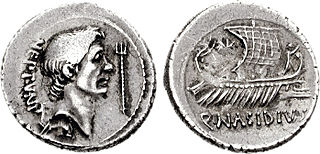Related Research Articles
The gens Pontia was a plebeian family at ancient Rome. Few members of this gens rose to prominence in the time of the Republic, but the Pontii flourished under the Empire, eventually attaining the consulship. Pontius Pilatus, as prefect of Judaea, is known for his role in the execution of Jesus.
The gens Octavia was a plebeian family at ancient Rome, which was raised to patrician status by Caesar during the first century BC. The first member of the gens to achieve prominence was Gnaeus Octavius Rufus, quaestor circa 230 BC. Over the following two centuries, the Octavii held many of the highest offices of the state; but the most celebrated of the family was Gaius Octavius, the grandnephew and adopted son of Caesar, who was proclaimed Augustus by the senate in 27 BC.
The gens Afrania was a plebeian family at Rome, which is first mentioned in the second century BC. The first member of this gens to achieve prominence was Gaius Afranius Stellio, who became praetor in 185 BC.
The gens Barbatia was a minor plebeian family at Ancient Rome. The only member of this gens mentioned in history is Marcus Barbatius Philippus, a runaway slave who became a friend of Caesar, and subsequently obtained the praetorship under Marcus Antonius. Others are known from inscriptions.
The gens Servilia was a patrician family at ancient Rome. The gens was celebrated during the early ages of the Republic, and the names of few gentes appear more frequently at this period in the consular Fasti. It continued to produce men of influence in the state down to the latest times of the Republic, and even in the imperial period. The first member of the gens who obtained the consulship was Publius Servilius Priscus Structus in 495 BC, and the last of the name who appears in the consular Fasti is Quintus Servilius Silanus, in AD 189, thus occupying a prominent position in the Roman state for nearly seven hundred years.
The gens Caecinia was a plebeian family of Etruscan origin at ancient Rome. Members of this gens are first mentioned in the time of Cicero, and they remained prominent through the first century of the Empire, before fading into obscurity in the time of the Flavian emperors. A family of this name rose to prominence once more at the beginning of the fifth century.
The gens Titia was a plebeian family at ancient Rome. The gens is rarely mentioned in the Republican period, and did not rise out of obscurity till a very late time. None of its members obtained the consulship under the Republic, and the first person of the name who held this office was Marcus Titius in BC 31.
Decimus Carfulenus, called Carsuleius by Appianus was a Roman statesman from the time of the Civil War to the Battle of Mutina, in which he perished.
The gens Furnia was a plebeian family at ancient Rome. The Furnian gens was of great antiquity, dating to the first century of the Republic; Gaius Furnius was tribune of the plebs in 445 BC. However, no member of the family achieved prominence again for nearly four hundred years.

The gens Munatia was a plebeian family at Rome. Members of this gens are first mentioned during the second century BC, but they did not obtain any of the higher offices of the Roman state until imperial times.

The gens Nasidia was an obscure plebeian family at Rome. The gens is best known from Quintus Nasidius, one of the admirals of Gnaeus Pompeius Magnus during the Civil War. Although none of the Nasidii are known to have held any of the higher offices of the Roman state, a number are known from inscriptions. A coin of this gens depicts the head of Pompeius and a trident on the obverse, and on the reverse a ship, with the inscription Q. Nasidius.
The gens Petreia was a minor plebeian family at ancient Rome. Members of this gens are first mentioned toward the end of the second century BC, and several were distinguished as soldiers, but none of them ever attained the consulship.
The gens Racilia was a minor plebeian family at ancient Rome. Members of this gens are mentioned as early as the fifth century BC, but few of them achieved any prominence in the Roman state.
The gens Rubria was a plebeian family at ancient Rome. Members of this gens are first mentioned in the time of the Gracchi, but they did not rise to prominence until imperial times. The first of the Rubrii to obtain the consulship was Rubrius Gallus, some time before AD 68.
The gens Satria was a minor plebeian family at ancient Rome. Members of this gens are mentioned in the first century BC, and under the early Empire, but none of them rose higher than the rank of praetor. Otherwise the Satrii are known largely from inscriptions.
The gens Sittia was a minor plebeian family at ancient Rome. The most illustrious member of this gens was Publius Sittius, an adventurer who met with great success during the African War, after allying himself with Caesar.
The gens Staberia was a minor plebeian family at ancient Rome. Members of this gens are first mentioned in the final decades of the Republic, but they never achieved much importance. The most illustrious of the Staberii may have been the Grammarian Staberius Eros, though he was a freedman. One of this family served as a military tribune in the time of Vespasian, but none of the Staberii obtained any of the higher offices of the Roman state; the consul Marcus Pompeius Silvanus Staberius Flavianus belonged to the Pompeia gens, although he was probably descended from the Staberii through a female line.
The gens Staia was an obscure plebeian family at ancient Rome. Few members of this gens are mentioned by ancient writers, but a number are known from inscriptions. The most illustrious of the Staii was Lucius Staius Murcus, governor of Syria in 44 BC, and a military commander of some ability who served under several leading figures of the period.
The gens Albinovana was an obscure plebeian family at ancient Rome. No members of this gens are known to have held any of the higher offices of the Roman state, and hardly any are mentioned in history. The family is perhaps best known from Publius Albinovanus, an infamous participant in the civil war between Marius and Sulla, and from the first-century poet Albinovanus Pedo. A number of Albinovani are known from inscriptions.
The gens Turullia, occasionally spelled Turulia, was an obscure plebeian family at ancient Rome. Only a few members of this gens appear in history, but others are known from inscriptions.
References
- 1 2 William Smith, "Decimus Carfulenus", in Dictionary of Greek and Roman Biography and Mythology, vol. I, p. 612.
- 1 2 Friedrich Münzer, "D. Carfulenus", in Realencyclopädie der Classischen Altertumswissenschaft, Bd. III, Hlb. VI., cols. 1589, 1590 (1899).
- ↑ Chase, p. 118.
- 1 2 3 4 AE 1982, 380, AE 2003, 678.
- ↑ Cassell's, s.v. modestus.
- ↑ Chase, p. 110.
- ↑ Hirtius, De Bello Alexandrino, 31.
- ↑ Appian, Bellum Civile, iii. 66 ff.
- ↑ Cicero, Philippicae, iii. 9, Epistulae ad Familiares, x. 33, xv. 4.
- ↑ Broughton, vol. II, pp. 324, 352; Supplement, p. 14.